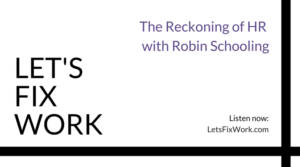 Robin Schooling is ‘America’s HR Lady’ and has been Laurie’s dear friend for quite some time. Despite that, Laurie has been putting off the HR episode because, frankly, HR has a bad reputation for fixing work. It took someone like Robin, who is breaking stereotypes around the globe, to make this episode possible. In today’s episode, Laurie and Robin talk about a slew of HR-related issues, from discrimination to whether HR is really needed.
Robin Schooling is ‘America’s HR Lady’ and has been Laurie’s dear friend for quite some time. Despite that, Laurie has been putting off the HR episode because, frankly, HR has a bad reputation for fixing work. It took someone like Robin, who is breaking stereotypes around the globe, to make this episode possible. In today’s episode, Laurie and Robin talk about a slew of HR-related issues, from discrimination to whether HR is really needed.
In this episode:
-What does it take to get the title, ‘America’s HR Lady,’ from Laurie? Robin has been in the HR profession for a long time. During her two decades of HR experience, she worked across many fields: healthcare, academia, banking, gaming, and that’s just to name a few. In other words, she’s pretty much done it all. And when asked how to fix work, Robin’s first question was how we would fix HR.
-Robin has a fantastic analogy on the state of work – it’s a hemophiliac who has fallen down too often and gotten too many bruises. Work might be broken, but it’s in the ER and needs urgent care if it’s going to be saved. Robin shares how she thinks we got there, based on her wide breadth of experience. She also dives into the power shift happening between job seekers, employees, and employers. The day of reckoning is at hand.
-Robin admits that HR is certainly part of the problem of work being broken, and the reason she gives is that HR as a department isn’t really sure where to place itself in the conversation. It started out as being very insular, and over the years, things have improved. But not enough. While HR departments have come to understand business, the next step is for them to understand the world. And what does that mean exactly? Robin explains.
-There’s also a fine line that many HR people must straddle: the needs of the employees and the needs of the business. Sound familiar? Robin says it’s a ‘cop out’ in many ways. Sure, there might be a bit of truth in it, but ultimately, being an advocate for both the business and the employees isn’t mutually exclusive. It’s not one or the other, and that’s where many HR people struggle.
-You’ve heard it many times – employees are fighting HR to get something they need. So why should anyone care about HR? Robin reminds us all that HR isn’t a faceless mass out to get you. They are your co-workers and they are people, too. In fact, Robin’s experience with other HR people is that they got into it for the right reasons and with a good heart.
-Recruiting is a huge part of human resources; it’s one of the happiest times for both HR and employee. But according to Robin, those good feelings don’t carry over. She offers the great idea of doing the same with employees as they navigate within the company, whether it’s handling health care, mediating disagreements, or even changing positions within the company. Ultimately, this little-by-little change is fueled by people caring for one another. And equally as important, HR people need to bring the stories of employee realities to leaders.
-Laurie asks if she’s naïve for believing that if we fix ourselves, we wouldn’t need HR, and Robin’s reply is priceless. In truth, HR as we know it will always be there. It has to be to ensure things are done according to legal requirements. Even with the automation that is becoming far more common, and Robin talks about why humans will always be needed in human resources.
-What is the future of HR? Robin sees it splitting into two separate departments or having two divisions within the same department: administration and people. The administration side deals with compliance, payroll, PTO, and the other dry things, while the people department works with employees to help them understand what’s happening, as well as growth and development.
-Are businesses and their HR departments ready for the reckoning that is coming? In fact, Robin believes that HR, at least, is poised for the shift. So what positions are in danger? Is the generalist here to stay? What about the firefighter? Robin shares her thoughts on who had better be ready to adapt to new roles and dive into specialties in the near future.
-So what does the future of HR look like? Robin has settled on a phrase: she is an advocate of the workplace revolution. It’s time to change – not only should you be an advocate and ally of the people who hired you, you should also be an advocate and ally to those who come to you with their work-related issues. It sounds simple, right? Robin reveals what it actually entails.
Robin Schooling
You must be logged in to post a comment.